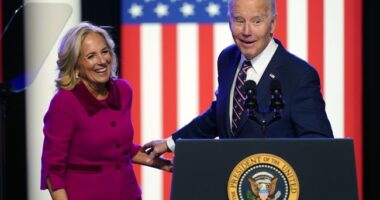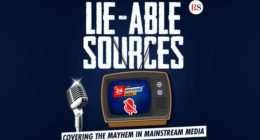
Brian Mast’s leadership, supported by his background as a military veteran and his unwavering dedication to core conservative values, offers a new perspective and resolute decision-making to a vital Congressional panel.
A Leader with Experience and Vision
Anchoring Brian Mast’s qualifications is his military service. Having served with honor in the U.S. Army, Mast possesses firsthand experience of the intricate nature of global conflicts and the hardships encountered by American troops overseas. His firsthand encounters provide him with a unique insight into various foreign policy matters, ranging from national security to humanitarian emergencies, setting him apart from many of his colleagues in Congress.
SEE ALSO:
WATCH: Rep. Brian Mast Levels Code Pink Protesters When Asked About a ‘Ceasefire’ With Hamas
How It’s Done: Rep. Brian Mast Just Mic Drops Fanatical Pro-Ceasefire Code Pinker
Presently heading the House Foreign Affairs Subcommittee on Oversight, Mast has already exhibited his adeptness in handling intricate matters with the precision and gravity they warrant. His leadership within the subcommittee has readied him to assume leadership of the entire committee, a role particularly crucial during a period where U.S. foreign policy necessitates both clear strategic direction and robust bipartisan collaboration.
Why Mast’s Leadership Matters Now
Mast’s selection comes at a critical juncture for U.S. foreign policy. The world is facing unprecedented instability:
- The Middle East: The war in Gaza and the collapse of the Assad regime in Syria have left the region teetering on the brink of chaos.
- Russia’s Ongoing Aggression: The war in Ukraine is set to enter its fourth year, with no clear resolution in sight.
- China’s Expanding Influence: Beijing continues to flex its geopolitical muscle, deepening ties with Asia-Pacific allies and challenging U.S. dominance in the region.
These are not abstract challenges—they are immediate threats that demand strong, focused leadership. Mast’s commitment to prioritizing U.S. national security and maintaining America’s global standing makes him an ideal candidate to guide the Foreign Affairs Committee through these turbulent times.
A Pragmatic Voice on Key Issues
Mast’s alignment with former President Trump’s policies on issues such as Ukraine aid indicates that he will bring a pragmatic and results-oriented approach to foreign policy debates. While other contenders for the chairmanship, such as Reps. Joe Wilson (R-S.C.) and Ann Wagner (R-Mo.), leaned toward more traditional stances on Ukraine, Mast’s position reflects the evolving priorities of the Republican Party and its base.
By striking a balance between skepticism of open-ended foreign aid and a commitment to U.S. leadership, Mast has proven he can adapt to the demands of a rapidly changing world.
Impressing the Steering Committee
Mast’s selection as chair was no foregone conclusion. Heading into Monday’s vote, he was considered a dark horse candidate against well-known figures like Reps. Darrell Issa (R-Calif.) and Ann Wagner. Yet, according to sources within the room, Mast’s presentation during the Steering Committee meeting was what sealed the deal. His ability to articulate a clear vision for the Foreign Affairs Committee and demonstrate his readiness to tackle pressing global challenges left a lasting impression on committee members.
This ability to win over influential decision-makers speaks volumes about Mast’s leadership style. He is not only a capable legislator but also a persuasive advocate for the policies he champions—qualities that will serve him well as chair of the Foreign Affairs Committee.
A Strategic Choice for Republicans
The Steering Committee’s decision to back Mast is also a strategically sound move for the Republican Party as it looks to define its foreign policy platform heading into the 2024 elections. Mast’s close ties to Trump and his alignment with the party’s more assertive, America-first approach to foreign policy will resonate with the Republican base. At the same time, his experience and credibility as a veteran make him a leader who can appeal to independents and moderates who prioritize national security.
Mast’s chairmanship will allow Republicans to sharpen their messaging on key foreign policy issues, from holding China accountable to ensuring that U.S. foreign aid aligns with national interests. His leadership will also provide a platform for the party to present a unified vision on the global stage—a crucial element as the U.S. grapples with increasing competition from authoritarian regimes.
Looking Ahead
While Mast still needs to be ratified by the full Republican conference, it is highly unlikely that they will oppose the Steering Committee’s recommendation. Once confirmed, Mast will take the helm of the Foreign Affairs Committee at a pivotal moment for U.S. diplomacy and global leadership.
The challenges ahead are daunting, but Mast has shown that he is up to the task. With his military background, proven leadership, and pragmatic approach to policy, Mast is poised to guide the Foreign Affairs Committee with the strength and clarity that these turbulent times demand.
The GOP Steering Committee’s backing of Brian Mast is a vote of confidence in his ability to lead with purpose and precision. His unique combination of experience, vision, and dedication to America’s interests makes him the right choice to chair the Foreign Affairs Committee.
At a time when the U.S. faces mounting threats from abroad, Mast’s leadership offers a steady hand and a clear direction. For Republicans—and for America—this is the right move at the right time.















